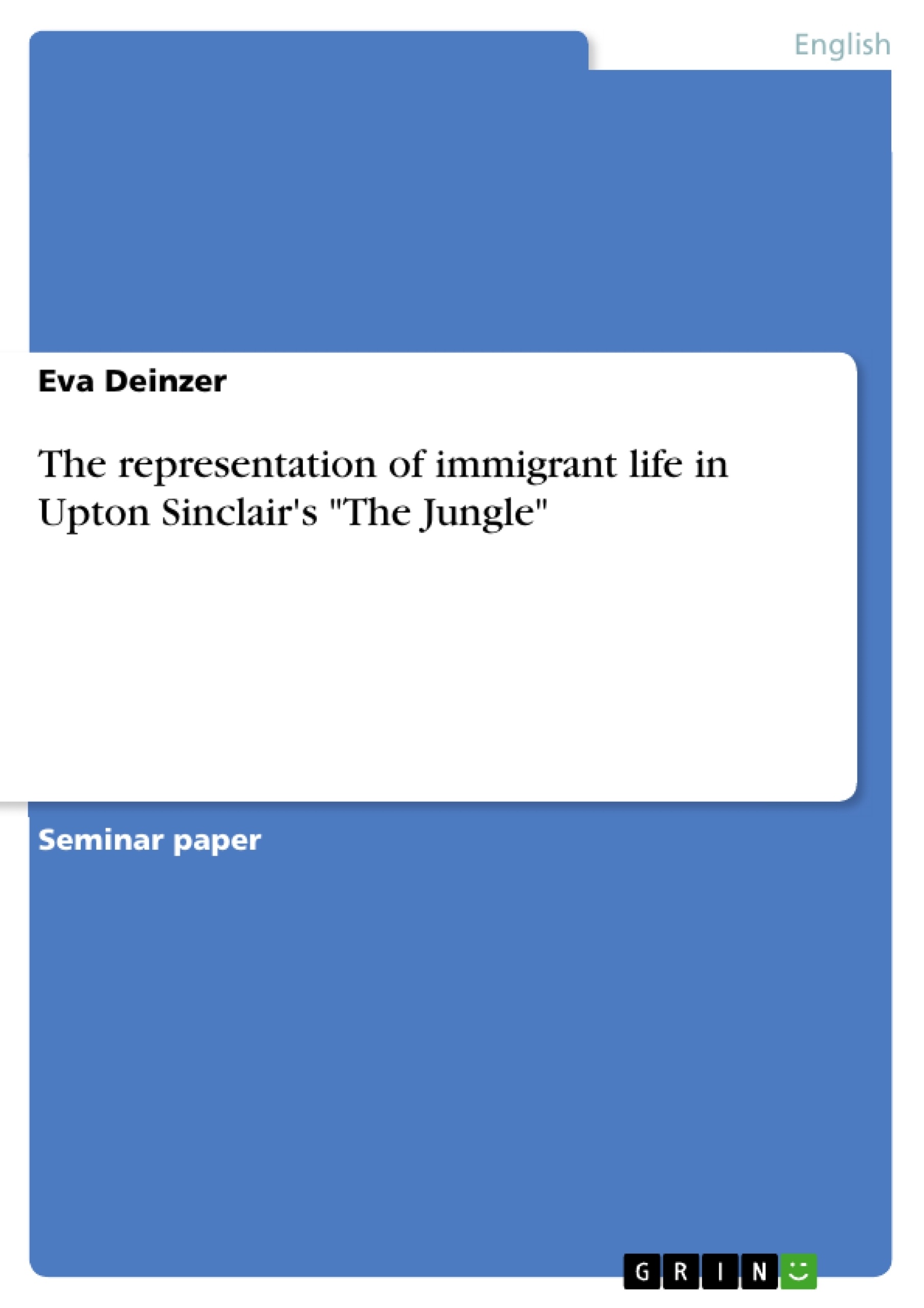In my paper I would primarily like to demonstrate how Sinclair represents the immigrant life in his book and how it ties with the reality at that time. However, before coming to this I would like to outline the immigration to and the urbanization in the United States in the Progressive Era and give a short summary of The Jungle.
Table of Contents
- Introduction
- Immigration and Urbanization
- Summary of The Jungle
- Social conditions of living of the immigrants and their representation in The Jungle
- Living Conditions
- Description and social consequences
- Literary representation
- Working Conditions
- Description and social consequences
- Literary representation
- Living Conditions
- Conclusion
Objectives and Key Themes
This paper aims to analyze the representation of immigrant life in Upton Sinclair's The Jungle, connecting the novel's depiction to the historical realities of the Progressive Era. The analysis will focus on how Sinclair portrays the living and working conditions faced by immigrants, exploring the social consequences and literary techniques employed.
- Immigration and Urbanization in the Progressive Era
- Living and Working Conditions of Immigrants in Chicago
- Sinclair's Literary Techniques and Investigative Journalism ("Muckraking")
- Social Commentary and Critique of Capitalism in The Jungle
- The Impact of Industrialization on Immigrant Communities
Chapter Summaries
Introduction: This chapter sets the stage by introducing Upton Sinclair's The Jungle within the context of the Progressive Era in the United States. It highlights the significant wave of immigration during this period, driven by the search for better opportunities and fueled by industrialization. The chapter establishes the novel's background, explaining Sinclair's investigative journalism and his socialist perspective, which shaped his approach to depicting the harsh realities faced by immigrant workers in Chicago's meatpacking industry.
Immigration and Urbanization: This chapter delves into the historical context of immigration and urbanization in the United States during the Progressive Era. It uses Emma Lazarus's poem inscribed on the Statue of Liberty to illustrate the allure of America for immigrants seeking freedom and opportunity. The chapter details the "new immigration" from Eastern and Southern Europe, highlighting the prejudices and opposition faced by these newcomers due to their cultural and religious differences from the existing American population. The chapter also emphasizes the dramatic growth of American cities, particularly Chicago, driven by industrialization and the influx of immigrants.
Summary of The Jungle: (Note: A detailed summary of *The Jungle* itself is omitted to avoid spoilers, as requested.)
Social conditions of living of the immigrants and their representation in The Jungle: This chapter analyzes the living and working conditions of immigrants as depicted in The Jungle. It examines both the factual descriptions of their struggles (poverty, disease, inadequate housing) and Sinclair's literary methods of conveying those struggles. It explores how Sinclair uses these descriptions to critique the social and economic systems that allowed such conditions to exist, focusing on the exploitation of vulnerable populations and the consequences for immigrant communities.
Keywords
Upton Sinclair, The Jungle, Progressive Era, immigration, urbanization, Chicago, meatpacking industry, working conditions, living conditions, social commentary, muckraking, investigative journalism, capitalism, socialism, immigrant experience.
Frequently Asked Questions: Analysis of Immigrant Life in Upton Sinclair's *The Jungle*
What is the purpose of this document?
This document provides a comprehensive preview of an academic paper analyzing the representation of immigrant life in Upton Sinclair's The Jungle. It includes a table of contents, objectives and key themes, chapter summaries, and keywords.
What are the key themes explored in the paper?
The paper focuses on the living and working conditions of immigrants in Chicago during the Progressive Era, as depicted in The Jungle. It examines Sinclair's literary techniques, his social commentary, and the impact of industrialization and capitalism on immigrant communities. The historical context of immigration and urbanization in the Progressive Era is also a key theme.
What aspects of immigrant life are analyzed in the paper?
The analysis delves into both the living conditions (housing, poverty, disease) and working conditions (exploitation, dangers) faced by immigrants in Chicago's meatpacking industry. It explores how these conditions are represented in Sinclair's writing and the social consequences that arose from them.
What is the role of Upton Sinclair's writing style in the analysis?
The paper examines Sinclair's literary techniques and his use of investigative journalism ("muckraking") in portraying the harsh realities faced by immigrant workers. The analysis considers how his writing style contributes to his social commentary and critique of capitalism.
What is the historical context of the paper?
The paper situates The Jungle within the context of the Progressive Era in the United States, highlighting the significant wave of immigration from Eastern and Southern Europe and the rapid urbanization of American cities, particularly Chicago. It explores the social and political climate of the time, including the prejudices and challenges faced by immigrant communities.
What is included in the document's table of contents?
The table of contents includes an introduction, a chapter on immigration and urbanization, a summary of The Jungle (without spoilers), a chapter analyzing the social conditions of immigrants and their representation in the novel, and a conclusion. The chapter analyzing social conditions is further broken down into sections on living and working conditions, each with subsections on description and social consequences, and literary representation.
What keywords are associated with this analysis?
Keywords include Upton Sinclair, The Jungle, Progressive Era, immigration, urbanization, Chicago, meatpacking industry, working conditions, living conditions, social commentary, muckraking, investigative journalism, capitalism, socialism, and immigrant experience.
What is the overall objective of the academic paper?
The paper aims to analyze how Upton Sinclair represented immigrant life in The Jungle, connecting the novel's depiction to the historical realities of the Progressive Era. The focus is on understanding the living and working conditions of immigrants and how Sinclair's literary techniques contributed to his social critique.
- Quote paper
- Eva Deinzer (Author), 2007, The representation of immigrant life in Upton Sinclair's "The Jungle", Munich, GRIN Verlag, https://www.grin.com/document/73679



